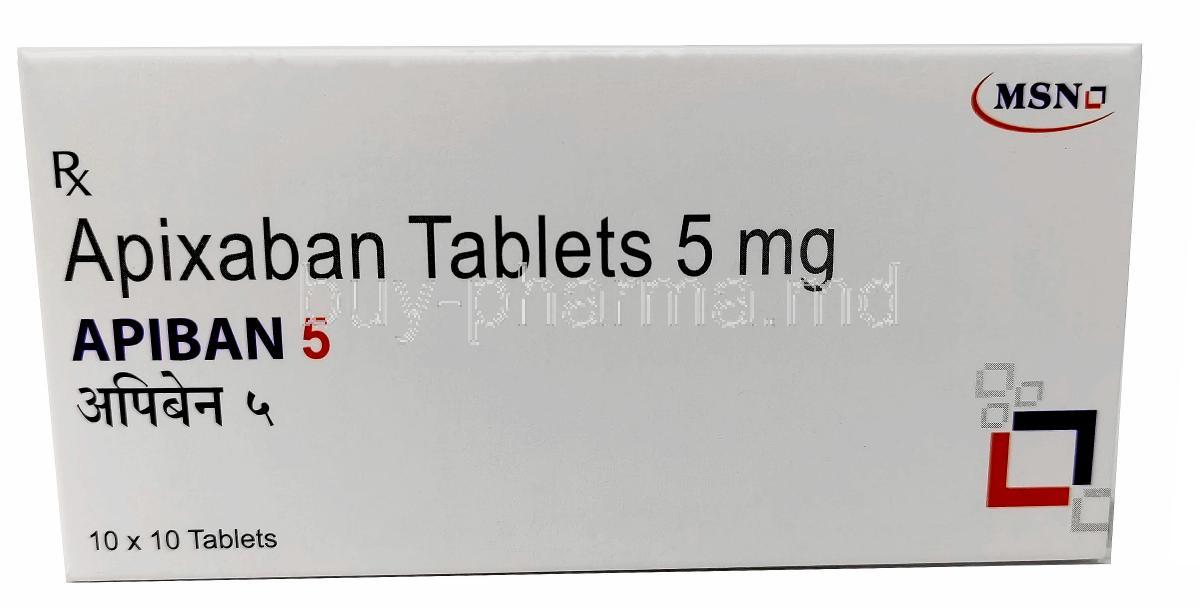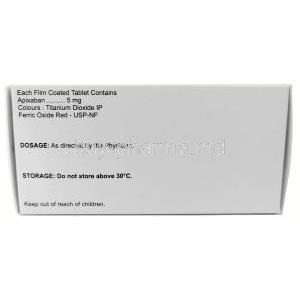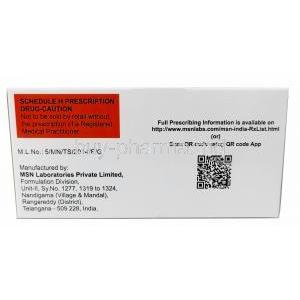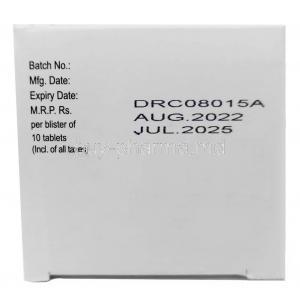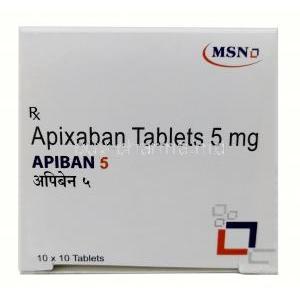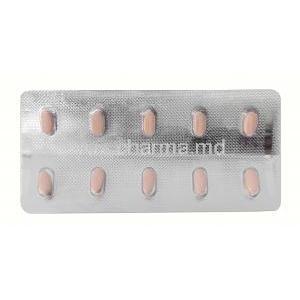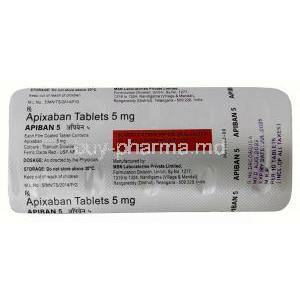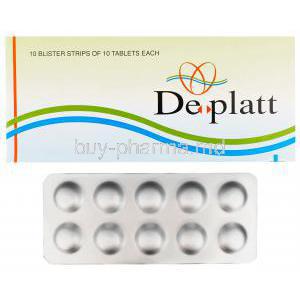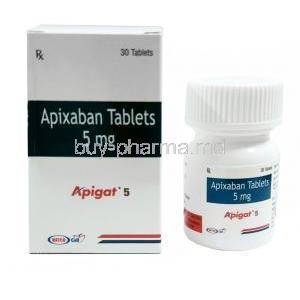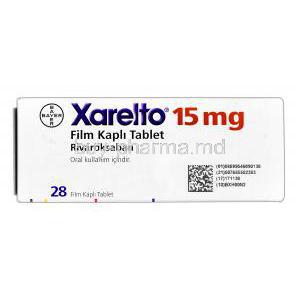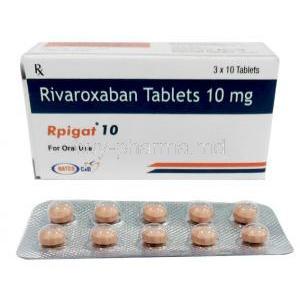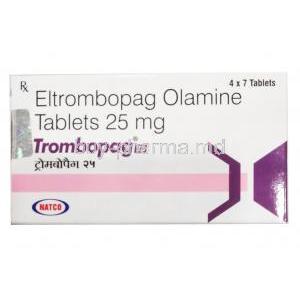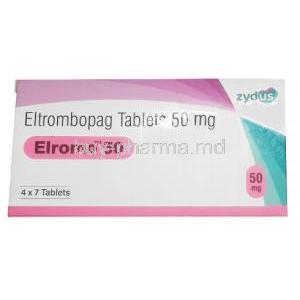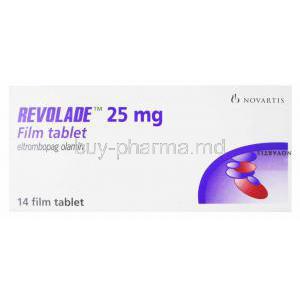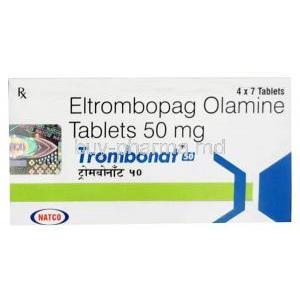What is Apiban?
Apiban, containing Apixaban, is a powerful drug that fights against stroke and blood clot formation. It belongs to an elite class of medicines known as direct factor Xa inhibitors which work to reduce risks associated with non-valvular atrial fibrillation - a common condition characterized by irregular heartbeats. Regularly taking this medication can prevent life-threatening clots from forming in your heart and potentially causing strokes!
Apiban, Apixaban is a potent anticoagulant to treat and prevent life-threatening deep vein thrombosis (DVT) and pulmonary embolism. It works by inhibiting factor Xa, interfering with the clotting process to reduce the risk of blockage or clump formation within veins, particularly those affected post-hip replacement surgery or at high risk due to other factors. By taking apixaban as directed, patients can look forward to improved health outcomes when facing DVT & PE-related complications!
What is Apiban used for?
Apiban, Apixaban, also sold as Eliquis, is an innovative oral medication widely used to help protect against stroke and blood clot-related issues in patients with non-valvular atrial fibrillation. This common form of irregular heartbeat can often lead to the formation of clots that may travel toward the brain; however, taking Apiban regularly reduces these risks.
Apiban is a potent anticoagulant that protects against the disastrous consequences of deep vein thrombosis (DVT) and pulmonary embolism (PE). Apiban has become indispensable in safeguarding patients at risk due to DVT or recovering from certain surgeries such as hip or knee replacements by inhibiting clotting factor Xa. Treating existing clots and preventing new ones from forming ensures that these life-threatening conditions can be treated effectively and avoided altogether.
How to use Apiban?
Apiban, is an oral tablet that helps keep your body healthy and functioning correctly. Though it's essential always to follow the instructions of your healthcare professional and read the prescription label closely when taking apixaban, here are some crucial tips for getting the maximum benefit from this medication:
Apiban, an anticoagulant medication used to treat non-valvular atrial fibrillation and to prevent deep vein thrombosis (DVT) or pulmonary embolism (PE), requires specific dosage instructions depending on the patient’s age, weight, and kidney function. For adults with typical conditions related to these ailments, a dose of 5 mg taken twice daily is usually sufficient; however, those over 80 years old or weighing 60 kg/132 lbs or less may need only 2.5 mg per day. For preventing DVT/PE after hip replacement surgery, a smaller regimen of 2.5 mg twice daily can be taken for optimal protection from blood clots in the veins without unnecessary side effects due to increased dosage strength.
Taking Apiban, apixaban regularly is essential for keeping your body's drug levels consistent. To make it easy to remember, stick with a daily schedule - take the medication once in the morning and once in the evening. You can enjoy this pill with or without food; swallow it whole with water! If you forget a dose, don't worry - take what you missed when remembering again that same day. Don't double up quantities; they could become dangerously high if taken too frequently.
What are the side effects of Apiban?
Apiban is a popular anticoagulant medication commonly known as Eliquis. Apiban carries some risks regarding its side effects - mainly bleeding that can occur anywhere on your body and vary from mild to severe. So make sure you stay aware when taking this powerful medicine! Some possible side effects of Apixaban include:
Bruising, nosebleeds, and bleeding gums are only the tip of the iceberg on the side effects caused by Apiban. People may also experience prolonged bleeding from cuts, heavier or longer menstrual cycles in women, blood present in urine (hematuria), stools (hematochezia) and even coughed up through saliva (hemoptysis). In extreme cases, there can also be intraocular bleeding within the eye.
Apiban can be an effective medication, but it is essential to stay aware of the more serious side effects that may arise from taking it. These include severe or uncontrollable bleeding, hemorrhagic stroke in areas such as the brain, and spinal hematoma formation, which could occur if you are undergoing a procedure involving anesthesia. Furthermore, allergic reactions with rashes or swelling can also develop while on this medication. Therefore talk to your doctor before starting any new drugs, and don't hesitate to seek help should you experience these potential risks while using Apixaban!
What are the alternatives to Apiban?
Instead of Apiban (Eliquis), patients can explore a variety of anticoagulant medications tailored to their particular medical needs and personal characteristics.
- Warfarin (Coumadin, Jantoven): This vitamin K antagonist has been used for many years as an oral anticoagulant. It requires regular blood tests to monitor the international normalized ratio (INR) and adjust the dose accordingly. Warfarin interacts with many medications and certain vitamin K foods, which may require dietary adjustments.
- Dabigatran, or Pradaxa, is a direct thrombin inhibitor taken orally, which offers an alternative to warfarin for people who don't want the hassle of regular blood tests. Although more costly than its counterpart medication at times, it's worth considering as another option when managing long-term conditions such as anticoagulation therapy.
- Rivaroxaban, or Xarelto, is an innovative oral medication that inhibits a particular enzyme in the body – just like apixaban. Unlike warfarin, it has minimal drug and food interactions, making life easier for patients who take this medicine daily. There's also no need to monitor INR levels with regular appointments; as easy as taking one oral pill daily!
- Edoxaban (Savaysa) is an innovative, oral direct factor Xa inhibitor that reduces the risk of stroke in those with non-valvular atrial fibrillation and can be used as a treatment for deep vein thrombosis and pulmonary embolism. Developed from revolutionary research into preventing blood clots, this medication looks set to provide relief for millions who suffer from these conditions yearly.
- Injectable anticoagulants, such as heparin and its low-molecular-weight variants like enoxaparin (Lovenox) or dalteparin (Fragmin), are used to protect against blood clots in the short or long term. They also act as a bridge between oral medications for those needing extra care.
- Fondaparinux, or Arixtra, is a potent synthetic anticoagulant designed to protect from deadly Deep Vein Thrombosis (DVT) and Pulmonary Embolism (PE). It works by selectively inhibiting factor Xa in the body - an essential component of clot formation. In other words: say Goodbye to DVT and PE!
Navigating which anticoagulant is the right choice for your situation can be bewildering. There are various factors to consider, from a medical condition and history to drug interactions, cost, and personal preference. Fortunately, you don't have to go it alone; with an experienced doctor helping assess what's best for you specifically, finding a path forward has never been easier.
How does Apiban compare to its alternatives?
Apiban (Eliquis) stands out amongst anticoagulant medications due to its ability to help protect against stroke and blood clots. This powerful drug works by inhibiting direct factor Xa, making it an effective treatment option for patients with non-valvular atrial fibrillation and those suffering from deep vein thrombosis or pulmonary embolism. Compared to similar pharmaceuticals, Apiban provides superior protection while minimizing the risk of adverse side effects common in many traditional drugs today. Here is a comparison of apixaban with some of its alternatives:
- Apiban and Warfarin (Coumadin, Jantoven) have been duking it out for years in oral anticoagulants. While warfarin has long held its place thanks to time-honored tradition, apixaban is giving it a run for its money! This modern marvel requires no blood tests compared to traditional warfarin with all that tedious INR monitoring business. It only needs minimal attention when dealing with food or drug interactions - plus, you can sleep easy at night knowing your risk of significant bleeding is much lower.
- Apiban and dabigatran are two viable anticoagulant options for patients looking to manage their risk of developing blood clots. Dabigatran is a direct thrombin inhibitor taken orally, eliminating the need for frequent INR monitoring like warfarin requires. Similar safety profiles have been seen in studies between these medications, making it possible that patient factors such as cost or dosing preferences may be deciding factors when choosing one option over another.
- Though their intake requirements differ, Apiban and rivaroxaban are direct inhibitors of the same enzyme. While Apiban is taken twice a day to be effective, its risk for significant bleeding may be lower than once-daily rivaroxaban. Comparison studies have shown that while they offer similar efficacy and safety profiles, subtle differences may exist between them worth exploring further.
- Apiban and Edoxaban are direct Factor Xa inhibitors, but with a few differences. While they have the same efficacy and safety ratings, Apiban must be taken twice daily for its full effect; however, edoxaban only requires once-daily dosing. This is important to consider when weighing your options between these two popular medications!
- Apiban and injectable anticoagulants such as heparin, low-molecular-weight heparins (enoxaparin, dalteparin), and fondaparinux are used to prevent blood clots. While injectables offer short-term or in-hospital anticoagulation benefits, Apiban is more convenient for long-term use with its oral medication option. Unlike heparin or LMWHs, which require frequent monitoring tests like anti-factor Xa levels -Apiban offers a much easier route to manage your risk against Deep Vein Thrombosis (DVT) without regular laboratory tests.
Regarding anticoagulant medications, the best choice for you is a unique combination of individualized factors. Your doctor will work with you and consider your medical history, drug interactions, cost-effectiveness, and desires in determining what's suitable for your healthcare journey.
How effective is Apiban?
Apiban, which contains the active ingredient apixaban, is as effective as the brand-name Eliquis. Both versions have the same active ingredient, dosage, strength, quality, and intended use. The efficacy of Apiban is well-established in clinical trials. It is effective in preventing stroke and blood clots in patients with non-valvular atrial fibrillation and treating and preventing deep vein thrombosis (DVT) and pulmonary embolism (PE).
Generic medications must undergo rigorous testing and approval by regulatory authorities, such as the U.S. Food and Drug Administration (FDA), to ensure they are bioequivalent to their brand-name counterparts. This means they should have the same therapeutic effects, safety, and quality as the brand-name drug.
Choosing Apiban can provide the same therapeutic benefits as the brand-name version. Still, it may be less expensive since different companies manufacture it after the original patent has expired. However, always consult your doctor before starting any new medication, including generic versions of a drug you already take.

